 Petzlover
PetzloverBoth American Bully and American Molossus are originated from United States. American Bully may grow 16 cm / 6 inches shorter than American Molossus. Both American Bully and American Molossus are having almost same weight. Both American Bully and American Molossus has almost same life span. Both American Bully and American Molossus has same litter size. American Bully requires Low Maintenance. But American Molossus requires Moderate Maintenance
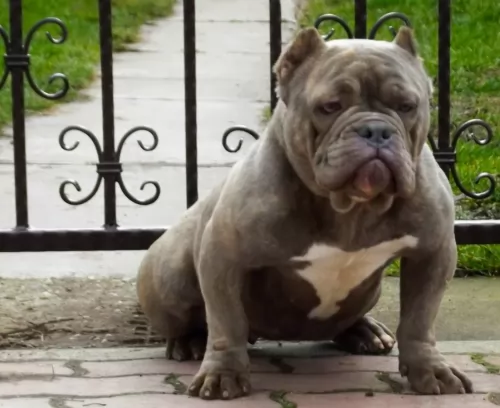 The American Bully breed was founded in the United States in the mid of 1990s also recognized by the United Kennel Club on July 15, 2013. They are augmentation from the American Pit Bull Terrier breed. The ultimate goal of creating this breed was the best family companion. They are selective breeding which means the characteristics and their temperament are artificial ones. So they are influenced by several other breeds like English Bulldog and Olde English Bulldog. Even though they are selective breeding, they possess the peculiar temperament is ultimate companion to their owners.
The American Bully breed was founded in the United States in the mid of 1990s also recognized by the United Kennel Club on July 15, 2013. They are augmentation from the American Pit Bull Terrier breed. The ultimate goal of creating this breed was the best family companion. They are selective breeding which means the characteristics and their temperament are artificial ones. So they are influenced by several other breeds like English Bulldog and Olde English Bulldog. Even though they are selective breeding, they possess the peculiar temperament is ultimate companion to their owners.
Based on the massive dog of Mesopotamia in 5000 BC, the American Molossus is the same dog recreated in the United States by and for the lovers of these giant dogs. The ancient Molossus was fierce to look at, massive in size, courageous and loyal. He was undaunted by any animal and stood up to any man attempting to hurt his master. When Rome fell the descendants of today’s Molossus were scattered and attempts to revive the breed have created carious large dogs. The American Molossus is the first true recreation that hits the mark.
The original Molossus was one of the most primitive of dogs, one of the earliest dogs that men domesticated. Their initials duties were the guarding of herds and homes against all enemies. They were incredibly loyal to their one master and stayed with him and protected him. These dogs also ate carrion and served the villages by eliminating animal carcasses. They could handle any other hunting animals such as wolves and large cats. This dog, although extinct was the ancestor of all the Mastiff-type dogs of today. The Molossus is said to be the ancestor of the St. Bernard, English Mastiff, Greater Swiss Mountain Dog, Bernese Mountain Dog, Newfoundland, Great Dane, Great Pyrenees, Rottweiler, Rottweiler and the Neapolitan Mastiff. Now these breeds have become the ancestry of the American Molossus.
According to Marcus Curtis, the founder of the new Molossus, the nearest relative of the American Molossus is the Neapolitan Mastiff. The Hines Bulldog, German Rottweiler, American Bandogge, and South African Boerboel together with the Neapolitan Mastiff were used to form the American Molossus. The goal of the founder was to make a great family pet and protector. It was specifically bred to be courageous, loyal and protective.
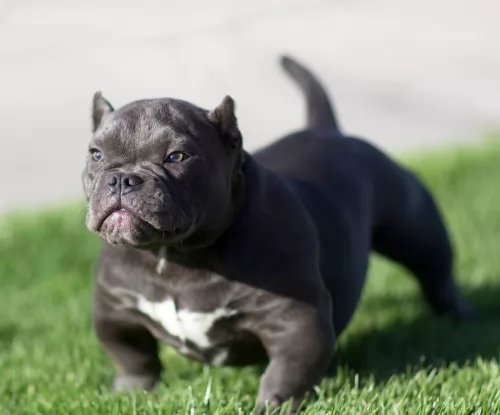 They have proper muscle tone. They are a good family dog. They are very active and agile because of their head and body proportion are balanced. Even though they are a smooth coat dog, they have a great strength because of their size. The super power of this dog possess tremendous stamina and power. An ultimate are essential for maintain the proper muscle tone and also avoid the gain of overweight. The American Bully dog possesses the intense energy to do well in performance and showcase their talents in the events.
They have proper muscle tone. They are a good family dog. They are very active and agile because of their head and body proportion are balanced. Even though they are a smooth coat dog, they have a great strength because of their size. The super power of this dog possess tremendous stamina and power. An ultimate are essential for maintain the proper muscle tone and also avoid the gain of overweight. The American Bully dog possesses the intense energy to do well in performance and showcase their talents in the events.
There are four kinds of American Bully. Each and every breed has minor difference in their appearance also characteristics. They are,
They have medium and large size compact body than the other varieties. The impression of this dog gives little bit rough and tough. But their behaviour is so gentle and also easily mingle with the people and fellow dogs.
The Classic kind is the inspired American Bully. They are light weight than the other varieties. So they have lighter body and less body mass. They have bones substance only not in buff.
The pocket bully possess the same characteristics and appearance of Standard bully. But the only one difference between both of us is height. The pocket bully is shorter than Standard. Even though it is a pocket bully it does not fit in anyone’s pocket, just for kidding.
Extra Large bully have heavily muscled. So they are very impressive according to the appearance wise. This is also similar to the Bully Standard, they are same in characteristics, temperament and appearance. They are easily weight gaining.
UKC- United Kennel Club
APBT- American Pit Bull Terrier
This is a giant, massive dog in every way and this recently developed standard makes that very clear. The Molossus should be heavy bones, muscular with a lot of loose skin and wrinkles of all kinds, everywhere. He is an intimidating presence, with a massive square head, broad shoulders, height and mass. No, the American Molossus is not athletic, but he certainly is intimidating.
His head is massive in comparison to his body and it must be square. He has extensive wrinkles and pendulous lips and dewlap. The face is all folds of skin and wrinkles. Deep set eyes, drooping upper lids and lower lids as well as an intimidating expression. His brow is well developed with a marked frontal furrow. The nose is large, and the muzzle is about a third of the length of its head. It is short and broad. Everything about the head must be square. It’s neck and body are powerful and muscular. The chest is deep, wide and barrel like. The back is also powerful and muscular. The front legs are heavy and muscular while the hind legs are broad, strong, powerful and wide-stance. Do not remove the front dew claws. His tail is thick and wide then gradually tapers at the tip.
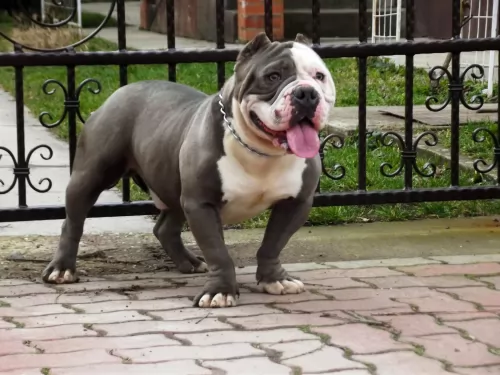 The American Bully is ultimate family companion. They are very loving and gentle with the people and their fellow dogs. They are extremely affectionate with family members.
The American Bully is ultimate family companion. They are very loving and gentle with the people and their fellow dogs. They are extremely affectionate with family members.
This breed is the best companion also obedient to their owners. It is very intelligent because they have a decision caliber. If anyone make harm to their master, it will aggressive and ready to bite those people. This breed possesses the loyalty and amiable.
They are love to play with kids. This breeder have unique character like extreme tolerance with children. Even though it may be calm in nature, you have to frequently monitor while playing kids with dogs.
The breed is versatile and capable of accomplishing a wide variety of tasks. Like Frisbee, swimming, hide and seek and throw ball. If athlete train the dog they are perform and showcase their talents in the events. Even though they are outgoing dogs, they strictly follow their rules instruct by the master. They are obedient and trustworthy.
American Bully will do okay in an apartment living. Even though they live in moderate weather, they prefer warm climates only. They are love to live with people or even fellow dogs.
The American Molossus is an intimidating massive giant bred for protection and guard duty. He is incredibly loyal to his family and courageous in his protection of them. They are guard dogs, not attack dogs. Their simple appearance is usually enough to frighten off anyone intending harm on their families. He is in reality a loving giant. He is intelligent and stable with a strong desire to please his owner. He is a calm yet vigilant presence in the home.
Because the Molossus is so large, it is recommended that the puppy be socialized and trained professionally. It takes a strong owner to handle this breed. They need to know the rules and have the rules consistently applied. The owner must be the pack leader.
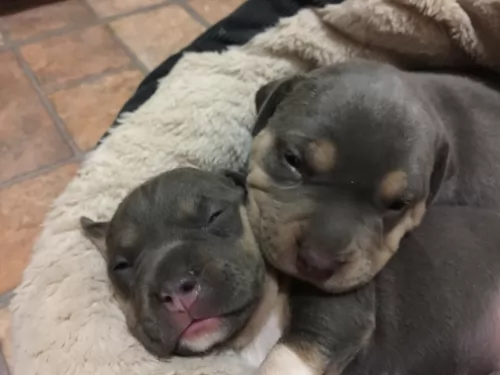 Some bully breeders give drugs to their dogs. For the purpose a large muscular body and glossy hair. When the drugs are stopped the dog’s body shrinks back down to a normal size and the hair fall may happen. But it will made many health issues to their dogs, especially it will create organ and joint problems. So better to avoid the usage of drugs.
Some bully breeders give drugs to their dogs. For the purpose a large muscular body and glossy hair. When the drugs are stopped the dog’s body shrinks back down to a normal size and the hair fall may happen. But it will made many health issues to their dogs, especially it will create organ and joint problems. So better to avoid the usage of drugs.
Sometimes drug’s impact can passed from mother to puppy. If you are adopt a puppy in the market be sure you can find a drug free dog. It will be avoid heritage issues also.
If the Bully have Cherry colour eye, are often affecting by the ectropion and entropion disease. It causes the eyelid is turned outwards away from the eyeball.
Like all Mastiffs the American Molossus faces a variety of potential illnesses, some brought on by its size, some not.
This could easily be a function of its massive size. It is a degenerative disease and can cause the dog to become lame. In many cases the vertebrae can fuse, or severe pain can result. This is mostly seen in older members of the breed.
Male Molossus can contract this inherited metabolic disease primarily. It can be life threatening and very serious as it affects the kidney and the bladder.
This is essentially Cervical Vertebral Instability (CVI) and is caused by the pressure of the nerves in the neck and cervical spinal cord. This compression can cause deformity, pain and abnormal stance/gait. IT has been attributed to the nutrition needs and rapid growth of the Mastiff breeds.
Like all giant Mastiff breeds the Molossus can have skin issues from the wrinkles, dysplasia in the joints which we will address below.
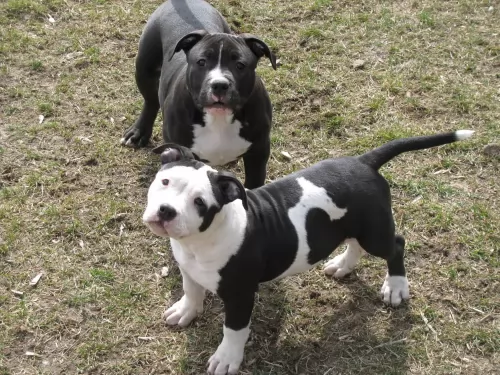 This breed is naturally have glossy hair. So we can easily groom it. If we are using the dry shampoo and brush the hair as necessary for improve the hair’s health. After bathe rub with a piece of towel because this breed is average shedder.
This breed is naturally have glossy hair. So we can easily groom it. If we are using the dry shampoo and brush the hair as necessary for improve the hair’s health. After bathe rub with a piece of towel because this breed is average shedder.
Vaccination should be the top priority for pets. It will prevent the dogs from rabies. Keep the health check-ups frequently at least once a year.
The worms can easily affect our breed. But we are not easily found unless bully avoid having the food and also checking bully’s waste matter. De-Worming can be prevent by checked every three months to the veterinarian.
Vitamin supplements can help your bully’s nutritional health. There are a lot of vitamin supplements are available in market, but we recommended choosing the best American Bully supplements. The best food for bully needs quality meats that contains high protein rich and fat.
Keep doing exercise is improve the bully’s physique. They are very interested to chase Frisbee. But swimming and walking will be good for them. They are keen bond with master and their family members also like to play with fellow dogs.
Remembering that this is a very, very large dog you need to be careful about nutrition and how fast your puppy will grow. American Molossus puppies need four meals a day until 12 weeks old. Then until they are 6 months old feed then 3 times a day. Finally, from 6-month-old puppy to adult – feed them twice in 24 hours.
At one year either feed them once or two small meals.
Many people feed their Molossus eggs, vegetables, fruit, and cottage cheese as ten 5 of the total for the day but avoid other table foods. The Molossus can become very picky about what he eats if you feed him too many table scraps.
In addition to the health problems listed above, the American Molossus is also susceptible to: Ditichiasis – Eyelashes that are in the margin of the eyelids and can cause eye irritation. May require surgery to correct.
Could cause blindness if not removed. Ectropian/Entropion: Eversion and inversion of eyelids which cause ocular irritation.
This is a degenerative disease which causes the dog to go blind. It is a disease the affects the retinal visual cells, first causing night blindness then day blindness. A DNA test is available for detecting PRA in all Mastiff breeds.
Common in large breeds and especially in giant breeds like the Molossus. Multiple forms and causes but all can cause pain and lameness.
Do to wrinkles and loose skin – check often for moisture and infections.
The is a problem based on a variety of possible causes. It happens when the puppy is between 6-16 months of age. Lameness occurs over time in one limb or in all. It can be intermittent and might be caused by diet, genetics, stress, autoimmune or metabolic issues or infection.
This issue is developmental as the dog’s toes turn either inward or outward, then as the condition advances the dog suffers fever, pain in all joints, lethargy and the inability to stand. This happens when the dog consumes too many calories for his activity level in the development times.
The American Molossus is not a couch potato. He needs to be walked at least twice a day and loves to play fetch. He will be greatly benefited by obedience training. Do not overdo it with exercise but make sure they don’t just lay around.